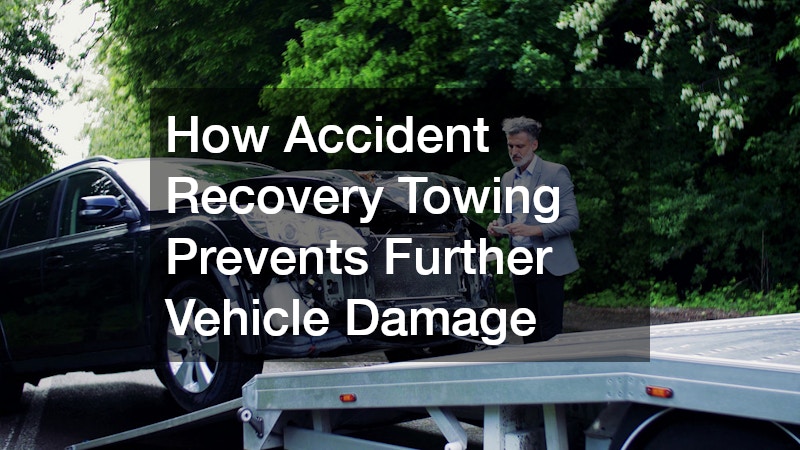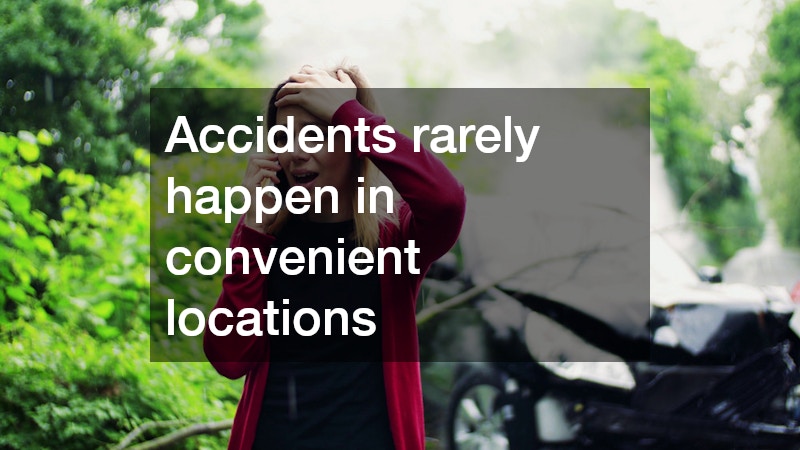Highlights:
-
Improper towing after a collision can cause transmission, suspension, frame, or wheel damage.
-
A towing company that provides accident recovery after collisions uses specialized equipment and trained personnel to prevent further harm.
-
Flatbed trucks, wheel-lift systems, hydraulic lifts, and winches are essential tools for safe recovery.
-
Professional towing ensures compliance with insurance requirements and streamlines claims.
-
Accident recovery towing is necessary for severe collisions, non-drivable vehicles, off-road incidents, and multi-vehicle accidents.
-
Choosing an experienced, licensed, and well-reviewed towing company ensures reliable service and vehicle protection.
-
Vehicle owners should document damage, remove valuables, and coordinate with trusted repair shops for a smooth post-accident process.

Accidents happen when we least expect them. Whether it’s a minor fender bender or a major collision, the aftermath of a vehicle accident can be stressful, frustrating, and costly. One crucial aspect often overlooked after a collision is how the vehicle is transported from the accident scene. Improper handling can exacerbate damage, create safety hazards, and inflate repair costs. This is where accident recovery towing comes into play.
Accident recovery towing is more than just transporting a vehicle from point A to point B. It involves specialized equipment, skilled professionals, and safety protocols that prevent further damage. In this article, we will explore how professional accident recovery towing works, the risks of improper towing, and why choosing the right towing company is essential for your vehicle’s safety and your peace of mind.
The Risks of Improper Towing
After a collision, vehicles are already in a vulnerable state. Attempting to move a damaged car without professional help can worsen existing problems or create new ones. Some common risks of improper towing include:
-
Transmission Damage: Vehicles with automatic transmissions are particularly susceptible to damage if towed incorrectly. Improper towing can lead to costly transmission repairs.
-
Suspension and Axle Issues: Dragging a car or using the wrong towing method can put excessive stress on the suspension and axles, leading to misalignment or broken components.
-
Body and Frame Damage: Lifting or pulling a car improperly may exacerbate dents, scratches, or even compromise the vehicle’s structural integrity.
-
Tire and Wheel Damage: Using improper towing equipment can cause tires to spin unnecessarily or wheels to bend, increasing repair costs.
These risks highlight the importance of relying on a towing company that provides accident recovery after collisions. Professionals know how to handle vehicles safely, ensuring the least amount of additional damage.
How Accident Recovery Towing Works
A towing company that provides accident recovery after collisions operates differently than standard towing services. Accident recovery requires a blend of skill, experience, and specialized equipment. Here’s a closer look at the process:
1. Assessment of Vehicle Condition
Before any towing occurs, the recovery team assesses the vehicle’s condition to determine the safest method of transport. Factors include:
-
Extent of visible damage
-
Vehicle type (sedan, SUV, truck, hybrid, electric)
-
Wheel alignment and suspension status
-
Engine and transmission functionality
This careful assessment ensures that the towing method used does not aggravate existing damage.
2. Securing the Vehicle
Once the assessment is complete, the vehicle is secured for transport. This step often involves:
-
Attaching the vehicle to a flatbed truck or wheel-lift tow system
-
Using heavy-duty straps and chains to prevent movement
-
Engaging brakes and placing wheel chocks for extra security
Securing the vehicle properly is vital to prevent additional damage during transit.
3. Specialized Equipment
Accident recovery towing often requires specialized equipment that a standard towing service may not offer. Key equipment includes:
-
Flatbed Tow Trucks: Ideal for vehicles that are severely damaged or cannot be driven safely.
-
Wheel-Lift Tow Trucks: Lifts only the front or rear wheels, allowing for secure transport without dragging the vehicle.
-
Hydraulic Lifts: Assist in lifting vehicles out of ditches, embankments, or off-road locations.
-
Winches: Pull vehicles gently from challenging positions without causing frame damage.
Using the right equipment ensures safe transportation and reduces the risk of further damage.
4. Transporting the Vehicle
After securing the vehicle, professionals transport it to the desired location, whether that’s a repair shop, impound lot, or the owner’s home. During transport, attention is paid to:
-
Smooth acceleration and braking to avoid jolting the vehicle
-
Careful navigation around corners and uneven roads
-
Monitoring the vehicle for any movement or shifting
Professional accident recovery towing minimizes the risk of aggravating existing damage, making it a critical step in post-collision care.
Benefits of Using a Professional Accident Recovery Towing Service

Hiring a towing company that provides accident recovery after collisions comes with multiple advantages. These benefits go beyond just moving a vehicle—they contribute to safety, cost savings, and convenience.
1. Preventing Further Vehicle Damage
The most immediate benefit is avoiding additional harm. Skilled towing professionals understand the proper lifting techniques, weight distribution, and handling requirements for all types of vehicles. This reduces the risk of:
-
Frame misalignment
-
Suspension or axle damage
-
Transmission failures
-
Additional body scratches or dents
2. Insurance Compliance
Many insurance policies require professional towing services for accident claims. Using a certified towing company ensures that:
-
The vehicle is transported safely
-
Insurance claims are processed smoothly
-
Documentation of vehicle condition is accurate
Failure to use professional accident recovery services could complicate insurance claims or reduce coverage.
3. Expertise in Challenging Situations
Accidents rarely happen in convenient locations. A towing company that provides accident recovery after collisions has experience handling:
-
Vehicles in ditches, medians, or off-road areas
-
Cars involved in multi-vehicle collisions
-
Damaged vehicles that cannot be driven safely
Their expertise ensures that the vehicle is removed efficiently, reducing stress and potential hazards on the accident scene.
4. Safety for Drivers and Passengers
Accident recovery towing also prioritizes the safety of everyone at the scene. Improper towing attempts can create additional risks, including:
-
Traffic disruptions
-
Secondary collisions
-
Physical injuries to drivers or bystanders
Professional towing teams follow safety protocols, manage traffic, and handle the vehicle safely, protecting all parties involved.
Situations Where Accident Recovery Towing Is Essential
Not all towing needs are the same. Some situations demand the expertise of a towing company that provides accident recovery after collisions:
-
Severe Collisions: Vehicles with major structural or body damage require flatbed transport to prevent further harm.
-
Non-Drivable Vehicles: If the engine, transmission, or wheels are compromised, professional towing is the only safe option.
-
Off-Road Incidents: Vehicles that leave the roadway or end up in ditches need specialized recovery equipment.
-
Chain-Reaction Accidents: Multi-car collisions can result in entangled vehicles that require careful handling.
In each of these scenarios, professional accident recovery towing prevents additional damage and ensures vehicles reach the repair facility safely.
Choosing the Right Towing Company
Selecting the right towing company that provides accident recovery after collisions is crucial. Here are factors to consider:
1. Experience and Training
-
Look for companies with certified accident recovery technicians
-
Ensure drivers are trained in handling different vehicle types and damages
-
Ask about experience with specialized equipment
2. Equipment Availability
-
Confirm the company has flatbeds, wheel-lift trucks, and winches
-
Check for additional tools like hydraulic lifts for off-road recovery
-
Ensure the equipment is well-maintained and modern
3. 24/7 Availability
-
Accidents can occur anytime; choose a company with round-the-clock service
-
Quick response times reduce stress and limit potential further damage
4. Reputation and Reviews
-
Read online reviews or ask for referrals
-
A reputable towing company prioritizes safety, professionalism, and customer service
-
Positive feedback often indicates reliability and expertise
5. Insurance and Licensing
-
Verify the company is fully licensed and insured
-
Coverage protects you from liability in case of mishaps during towing
-
Insurance ensures vehicle damage during transport is covered
Tips for Vehicle Owners After an Accident
While a towing company that provides accident recovery after collisions handles vehicle transport, there are steps vehicle owners can take to protect their vehicle and simplify the recovery process:
-
Document the Damage: Take photos of the vehicle before towing to have evidence for insurance claims.
-
Remove Valuables: Take personal belongings from the vehicle before towing.
-
Keep Key Contacts Handy: Have insurance and towing company numbers accessible.
-
Choose a Trusted Repair Shop: Work with reputable mechanics to prevent subpar repairs.
-
Stay Calm: Avoid moving the vehicle yourself; professional towing prevents further issues.
Common Myths About Accident Recovery Towing
There are several misconceptions about towing after accidents. Let’s debunk some of the most common myths:
-
Myth 1: Any Tow Truck Can Handle an Accident Vehicle
Not all tow trucks are equipped for accident recovery. Flatbeds or wheel-lift systems are often required for safe transport. -
Myth 2: DIY Towing Saves Money
Attempting to tow a damaged vehicle without expertise can result in greater costs due to additional damage. -
Myth 3: Towing Is Only Necessary for Non-Drivable Vehicles
Even vehicles that seem drivable may have hidden structural damage. Professional towing ensures safe handling and prevents further harm. -
Myth 4: Towing Companies Charge Excessively
While towing services cost money, using a professional service often saves money in the long run by preventing costly repairs.
Understanding these myths helps vehicle owners make informed decisions after collisions.
How Towing Companies Document and Handle Accident Vehicles
A professional towing company that provides accident recovery after collisions not only transports vehicles but also ensures proper documentation. This includes:
-
Condition Reports: Recording visible damage before towing
-
Digital Photos: Capturing the vehicle from multiple angles
-
Incident Reports: Logging the accident scene, location, and handling procedures
-
Coordination with Insurance: Providing documentation to facilitate claims
Accurate records protect both the vehicle owner and the towing company, ensuring accountability and transparency.
In Summary
Accidents are stressful, but how a vehicle is handled afterward significantly impacts repair costs, safety, and peace of mind. Choosing a towing company that provides accident recovery after collisions is critical to prevent further vehicle damage, ensure safe transport, and support insurance claims.
By understanding the risks of improper towing, the specialized procedures involved, and the benefits of professional accident recovery towing, vehicle owners can make informed decisions that protect their investment. Whether it’s assessing vehicle condition, securing the vehicle, using specialized equipment, or coordinating with repair shops, accident recovery towing plays a crucial role in the post-collision process.
Investing in a reliable and experienced towing company ensures that your vehicle reaches its destination safely, minimizing further damage and allowing for a smoother recovery process. After all, professional accident recovery towing is not just about moving a car—it’s about safeguarding your vehicle, your wallet, and your peace of mind.